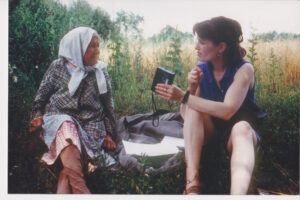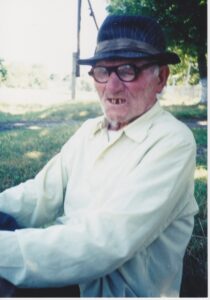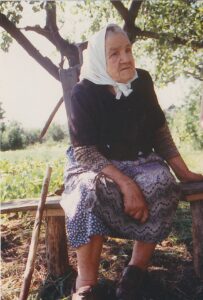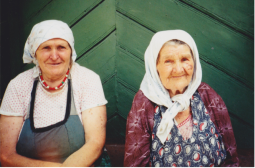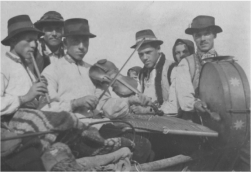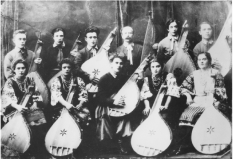Hanna Petrivna Honcharenko (Kharkiv region)
—Did young people gather for vechornytsi?
Hanna Petrivna: The older ones used to go to vechornytsi, not we. We used to gather just like that, like before, to spin yarn.
—Did you spin yarn?
Hanna Petrivna: My mother did, but not my generation. We used to just spin yarn for the rough, simple things.
Hanna Petrivna Honcharenko (Kharkiv region)
—Did the startsi play lira (hurdy-gurdy)?
Hanna Petrivna: It was long ago. Perhaps there was one man or one woman. They would come to the train cars also, telling stories about the war and the great misfortune. People sat there and cried listening to him [this person is discussing the post-Second World War period].
—Where in the train cars did you see them?
Hanna Petrivna: On a train to Kharkiv twelve to thirteen kilometers away from here. Valky, the regional [administrative] center, was five kilometers away from here.
—What did the startsi play?
Hanna Petrivna: Many sad songs about the war like “Aliosha.” People cried and gave them money or whatever food they had.
—Did the startsi go around with a harmonia?
Hanna Petrivna: No, a harmonia cost a lot of money. They would just pass by, and some people would let them in for the night.
—Did startsi have guides?
Hanna Petrivna: Yes, a woman or a child. One man in our village lost his sight during the war, and his daughter would bring him here to Valky. People would pay attention.
—Did he go around the villages asking for alms?
Hanna Petrivna: His daughter didn’t take him around the villages when she was little. When she was a bit older, she would bring him to Valky. He would spread a bag on the snow or ice, kneel on it, and people would give him some food or money.
—Were there any startsi in the village where you were born?
Hanna Petrivna: They were everywhere, but in our village, they were not the war veterans.
—When did they stop coming?
Hanna Petrivna: Not long ago, when the kolhospy spread and the administration changed. They started helping them.
Hanna Petrivna Honcharenko (Kharkiv region)
—Did your parents have a large family?
Hanna Petrivna: We were seven children. With my father and mother—a total of nine people.
—Did your grandparents live with you?
Hanna Petrivna: No, we lived at their place until my father built a house nearby.
—Who was the head of the household?
Hanna Petrivna: My father was the oldest. When we lived at my grandfather’s, he was the head of the household, too.
—How much land did your parents own?
Hanna Petrivna: My grandfather had more land. He was a beekeeper, a gardener, and a fisherman. He also had his mill. He was very hard-working.
…………………………………………………………………….
—When your grandfather was a landowner, did he hire any workers?
Hanna Petrivna: Mostly he worked on his own. His sons were helpful. Perhaps he hired someone once in a while. Then one of his sons died at war.
—When your grandfather owned a mill, did the local people come to him to grind the grain?
Hanna Petrivna: Of course.
—How did they pay?
Hanna Petrivna: I don’t know. We didn’t need bread so much since we had seven desiatyny. We baked bread and took it to Liubotyn to sell. At the time we had enough bread to feed two cows and piglets. What would we do with more bread? We worked hard, got up early in the morning, and slept on a cart not to miss the bread delivery.
Hanna Petrivna Honcharenko (Kharkiv region)
Hanna Petrivna: My father died in 1933.
—Did he die of starvation?
Hanna Petrivna: No. He had bilious fever. He caught it for the second time, and it took him.
Hanna Petrivna Honcharenko (Kharkiv region)
—Were there any neighborhoods [kutky] in your village?
Hanna Petrivna: Yes. Our village was very big.
—What was the name of the neighborhood where you were born?
Hanna Petrivna: Shliakh. We also had such neighborhoods as Yakry and Velykovykivka. The village was called Ohultsy.
